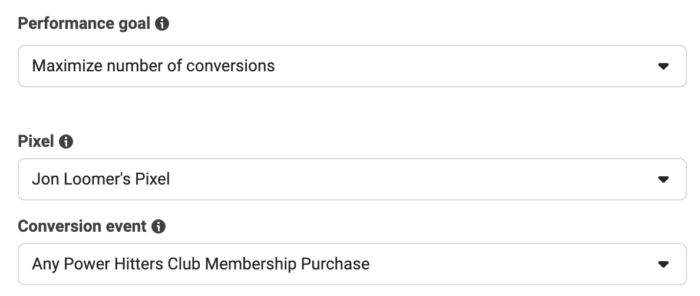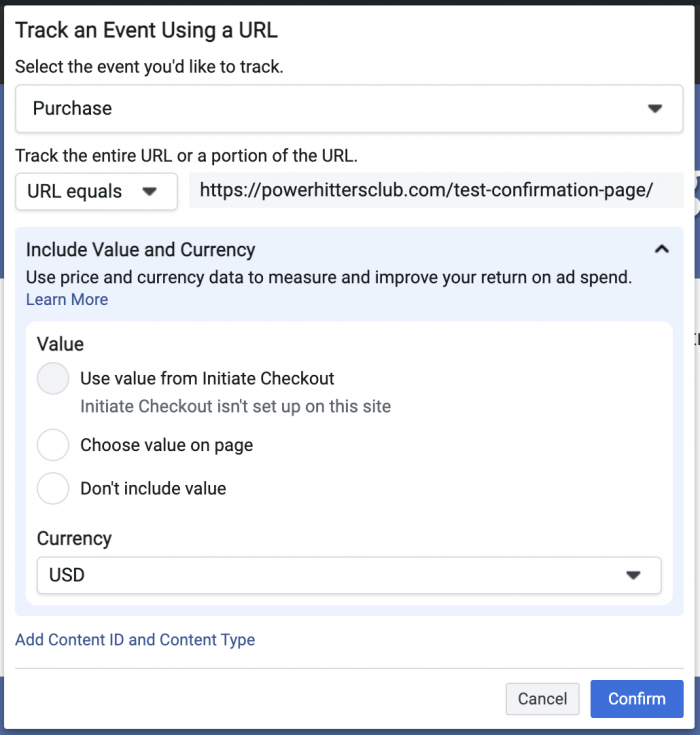One of the most critical elements of Meta advertising is the ability to define important actions that happen on your website or your owned properties. Once defined, you can pass that information to Meta for improved attributionAttribution is how Meta gives credit to an ad for a conversion. Your Attribution Setting determines how your ad will be delivered and the reporting attribution window. The default Attribution Setting is 7-day click and 1-day view, which means that anyone who converts within 7 days of clicking or 1 day of viewing your ad will be counted as a conversion. More, reporting, optimization, and targeting. This is possible with the help of standard events, custom eventsConversion events tracked by the pixel, app SDK, or API that are outside of standard events. These tend to be created to fit the publisher's needs when a pre-defined standard event will not. More, and custom conversionsCustom conversions let you create rules for events or URLs so that you can better track and optimize for specific actions with Facebook ads. More.
While foundational, it’s common for this topic to create confusion. I’m hoping to provide some clarity.
In this post, we’ll focus on the following:
- Definitions of standard events, custom events, and custom conversionsA conversion is counted whenever a website visitor performs an action that fires a standard event, custom event, or custom conversion. Examples of conversions include purchases, leads, content views, add to cart, and registrations. More
- Examples of each one
- Explanations of how they are used
- General tips on how they are created
- When should you use each?
Let’s go…
Definitions
Let’s provide some basic definitions to help you understand what each of these are and how they’re similar and different.
1. Events: This is how we define an important action. The most common application of events is on our website, though it doesn’t have to be. Someone visited our website and performed a specific action or group of actions that are important to us. That information is shared with Meta to help enhance our advertising.
2. Standard Events: Actions that are predefined by Meta. When you use one of these predefined labels for an action, Meta has an understanding of what that means. You can pass details (parameters) about that action that are relevant to the type of event.
3. Custom Events: Actions that go outside of the predefined standard events. It’s an important action that a specific advertiser wants to track, custom to their needs. Since it is custom, the data Meta has on a custom event is limited to individual websites.
4. Custom Conversions: Map events (standard or custom) to custom conversions to provide granularity for the purpose of reporting or optimization. Custom conversions help answer a question like how many of a specific product were purchased?
Examples
Make sense? Maybe not. Let’s provide some more detail by using examples…
1. Standard Events: There are at least 17 predefined standard events. Here are a few common examples:
- Purchase
- Add to Cart
- Initiate Checkout
- Complete Registration
- Lead
- Search
- Contact
When someone purchases a product on your website, the details of that event can be passed to Meta.
2. Custom Events: Since these aren’t predefined, there are limitless possibilities for custom events that fit priorities for each individual website. When possible, you should use standard events because Meta has global data related to those actions that can help with optimization. But, sometimes there are actions that are unique to your website. Here are a few examples of custom events that I use:
- 1-Minute Time on Page: Fires when someone spends at least one minute on a page
- 50% Scroll: Fires when someone scrolls at least 50% of the length of a page
- Video Watched: Fires when someone starts an embedded YouTube video
- Internal Link ClickThe link click metric measures all clicks on links that drive users to properties on and off of Facebook. More: Fires when someone clicks a link to another page of the website
- Bot Click: Fires when someone clicks my bot to begin a conversation with it
- Podcast Plays: Fires when someone starts the embedded podcast player that appears on some of my pages
- Social Share: Fires when someone clicks one of the social share buttons
3. Custom Conversions: Custom conversions can be used with either standard or custom events (or neither). Using rules, advertisers define a very specific conversion that can be used for reporting and optimization.
Let’s say that you are running a Sales campaignThe campaign is the foundation of your Facebook ad. This is where you'll set an advertising objective, which defines what you want your ad to achieve. More that optimizes for the Purchase standard event. This could be the purchase of any product, regardless of what you are promoting. The results column will include all purchases. If you want to isolate results to the purchase of a specific product, you could create a custom conversion.
How They’re Used
Standard and custom events have the same uses, so we’ll group them together in this section.
1. Standard and custom events: Both of these can aid reporting. Create a column in Ads Manager and you can see how many of that specific event can be attributed to your ads.

Both can also be used for ad setAn ad set is a Facebook ads grouping where settings like targeting, scheduling, optimization, and placement are determined. More optimization. When using the Website conversion location, you can set conversions as your performance goalThe Performance Goal is chosen within the ad set and determines optimization and delivery. How you optimize impacts who sees your ad. Meta will show your ad to people most likely to perform your desired action. More. Then, set a specific conversion event for optimization. This allows you to define your goal action so that Meta can make adjustments to delivery to make sure that you get as many of those actions as possible.

And finally, you can create custom audiences based on either standard or custom events. An example would be a custom audienceThis is the group of people who can potentially see your ads. You help influence this by adjusting age, gender, location, detailed targeting (interests and behaviors), custom audiences, and more. More of all people who have completed a purchase during the past 30 days. You could then target or exclude these people in your ad set.

2. Custom Conversions: Recall that custom conversions provide granularity that standard and custom events do not by themselves. So, in addition to having a column in your reporting for all purchases (based on the standard event), you could add a column for the purchase of a specific product (the custom conversion).

And instead of optimizing for the purchase of any product (your standard event), you could optimize your ad set for the purchase of a specific product (the custom conversion). That way, the algorithm knows that only the purchases of that product count towards your goal.

Unlike standard and custom events, custom conversions cannot be used for targeting. The granularity custom conversions provide don’t add any value to custom audiences. You can create a custom audience based on a standard or custom event and add granularity by creating rules.

How They’re Created
Once again, standard and custom events follow similar rules, so we’ll group them together here.
1. Standard and custom events: The most common method of creating standard and custom events is by using code in addition to your Meta pixel. This, of course, would only apply when creating events that fire on your website.
Here’s an example of basic code for a lead…
fbq('track', 'Lead');
You can use my Pixel Event Generator tool to assist with this.
In its most basic form, you’d create a custom event by replacing “Lead” above with an event that Meta won’t recognize — something other than one of the predefined standard events.
This code will typically fire on page load or when a dynamic action (like a button click) occurs. But, there are obviously several potential layers of complexity. While standard events tend to be straightforward in terms of how and when they fire, they sometimes require more complicated solutions.
Meta does offer a no-code option for creating standard events called the Event Setup Tool in Events Manager. It doesn’t offer much customization, so it should only be used in the most basic situations.

Custom events are often much more complicated. I use Google Tag Manager to create mine, which utilizes built-in triggers to track complex actions like scroll depth, time spent, and video plays.
These events aren’t always created with code, of course. You may have a third-party solution that makes the creation of these events easy. You can also pass events via the Conversions API, which could use website, offline, or CRM events. I use Stape to set up the Conversions API Gateway for web events.
2. Custom Conversions: Much easier! The nice benefit of custom conversions is that they don’t require code and they are created within Meta’s interface.
Access custom conversions by going to your Events Manager.

Create a new custom conversion. Pick an action source of either Website or Physical Store.

You can create a custom conversion based on URL alone by leaving Event at All Website Traffic and setting a URL rule. Here’s an example where a custom conversion is defined as a visit to any page of my website that includes “custom-conversions” in the URL…

You can otherwise base it on a custom event (assuming it is found on your website)…

Or a standard event…

And then create a rule based on URL, Referring Domain, or Event Parameters.

When Should You Use Each?
For the purpose of reporting and optimization, you can use any of these three. But understand that this isn’t a matter of only using one or the other. A good strategy utilizes all three.
1. Standard Events: You should prioritize standard events. Make sure that they fire any time one of these predefined actions happens on your website. It’s typically recommended to optimize for standard events rather than custom conversions when you can since the standard event will provide greater volume.
2. Custom Events: Make a list of all important actions that happen on your website. Is there a standard event that can define them? If not, consider setting up custom events. This will allow you to gain reporting and optimization for actions that are unique to your business.
3. Custom Conversions: Create custom conversions whenever you want to gain additional insight into your reporting. If you optimize for Purchases, Meta will report on all purchases in the Results column. If you create a custom conversion for a specific product, you can view how many purchases of that product your ads drove.
It’s common for advertisers to confuse these three. I regularly see the terms custom conversions and custom events used interchangeably, but they have very unique purposes.
Prioritize using standard events. Create custom events when a standard event can’t define an important action. And use custom conversions to add granularity to reporting.
Your Turn
How do you use standard events, custom events, and custom conversions?
Let me know in the comments below!





